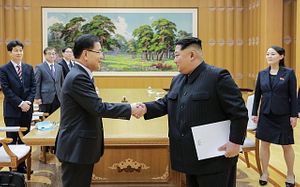U.S. President Donald Trump’s spontaneous decision to accept North Korean leader Kim Jong-un’s invitation to meet face-to-face has generated tons of commentaries by pundits and analysts of various stripes. However, few have figured out why so far neither the North Korean government nor Kim himself has stepped forward to confirm (or deny) the planned meeting. This is both interesting and puzzling.
One can only speculate on the reasons behind Pyongyang’s silence. There are several possibilities.
First of all, it is most likely that Kim Jong-un was caught off-guard by Trump’s impulsive decision to meet, reportedly made on the spot when the South Korean delegation was in the White House briefing U.S. officials on their just completed Pyongyang trip. Given that Trump and Kim have been engaged in a fiery war of words until recently, it is hard for Kim (or anyone) to believe that Trump is willing to talk without preconditions. Kim may need time to digest this and is apparently being very cautious about the significant development.
As a high-ranking Japanese Foreign Minister official said, describing the shockwaves reverberating in Tokyo after the announcement, “It never occurred to us that such a decision would be made at this time.” China was in a similar situation and was obviously not consulted by either Washington or Pyongyang in advance. During a phone conversation with Trump, Chinese President Xi Jinping expressed support for the Trump-Kim meeting and the diplomatic solution of the problem. Privately however, China is said to be concerned that its role may be diminishing on the Korean Peninsula. Both Japan and China worry that they may be left behind in the new diplomatic effort to address the North Korea nuclear issue.
Left unsaid in such analyses, however, is that North Korea itself, like other countries in the region, also appears unprepared for a sudden détente between Washington and Pyongyang.
Second, Kim’s invitation to Trump was verbally relayed by South Korean officials, who may have not conveyed Kim’s message accurately or completely. Before the South Korean envoys traveled to Pyongyang, they were not even sure whether they would be able see Kim Jong-un. It turned out that Kim met with them on the day of their arrival, and much of the conversation between Kim and the South Korean delegation took place over a lavish dinner. TV footage shows alcohol was served and captured a high-spirited Kim, with a broad smile, waving goodbye to his guests at the end of the dinner. It is questionable whether everything he said during that dinner reflects his true thinking.
For example, according to the head of the South Korean delegration, National Security Advisor Chung Eui-Yong, Kim Jong-un “understands” that joint U.S.-ROK military drills will proceed. This is highly doubtful, given North Korea’s longstanding opposition to U.S. forces in South Korea and joint exercises in particular. If that is accurate, Kim will have difficulty explaining to his own generals why the military drills are no longer a big problem now.
Third, North Korea is probably still gauging the international responses, such as studying how the announcement is received inside the United States and how regional powers, especially China, are going to react. Trump’s abrupt firing of Secretary of State Rex Tillerson, replacing him with the more hardline Mike Pompeo, does not seem reassuring to North Korea. Despite the fact that relations between China and North Korea have gone sour in recent years, China’s support remains critical for North Korea’s future. It would make sense for North Korea to reach out to China now to assure Beijing that its interests will not be sold out in the Trump-Kim meeting. It is possible that clandestine discussions between Beijing and Pyongyang are taking place now.
While waiting for North Korea’s official response, one must keep in mind that it is uncertain whether the Trump-Kim meeting will actually take place by May. Very soon, both sides will face problems such as finding a mutually acceptable location to meet. Unexpected developments between now and May could also derail the planned talks. For example, if the inter-Korean summit in Panmunjom between Kim Jong-un and South Korean President Moon Jae-in does not go well in April, it will be unrealistic to expect a smooth meeting between Trump and Kim the next month. And Kim (or Trump) can still cancel the meeting at the last minute. Didn’t Kim’s sister cancel her scheduled meeting with U.S. Vice President Mike Pence during the PyeongChang Winter Olympics? From the U.S. perspective, a lack of consensus within the Trump administration will weaken the U.S. position, and Trump may be unprepared to talk to Kim.
Finally, Kim’s silence may be related to the issue of prestige. Moon, who has led the latest overtures to the North, remarked that “important changes” were happening in East Asian geopolitics. “Should we succeed, there will be dramatic changes in world history, and [South] Korea will have played the leading role,” Moon stated. Is Kim Jong-un willing to give the limelight, and the credit, to Moon or Trump?
Zhiqun Zhu, Ph.D., is Professor of Political Science and International Relations at Bucknell University, the United States.

































